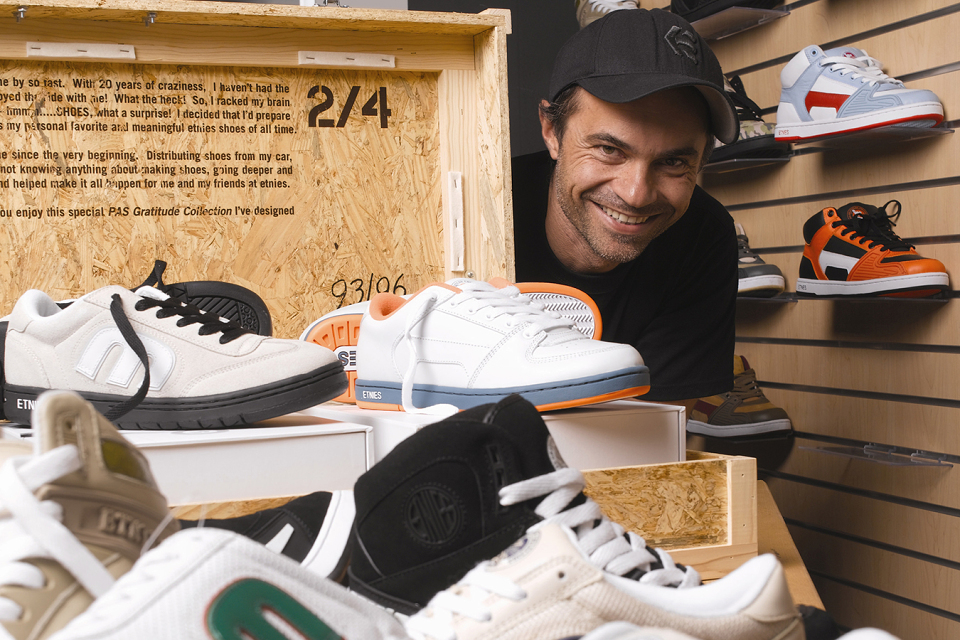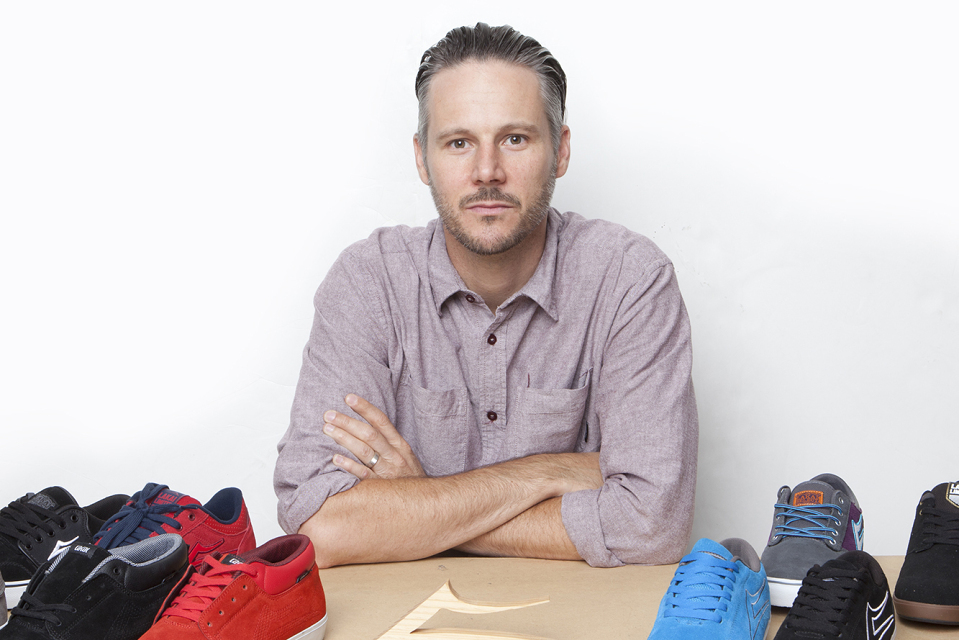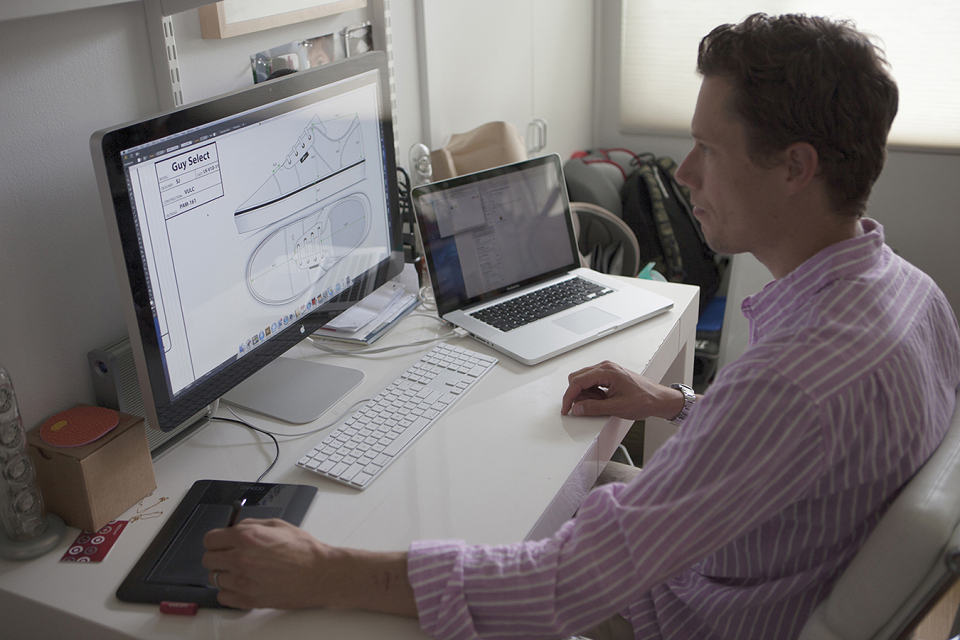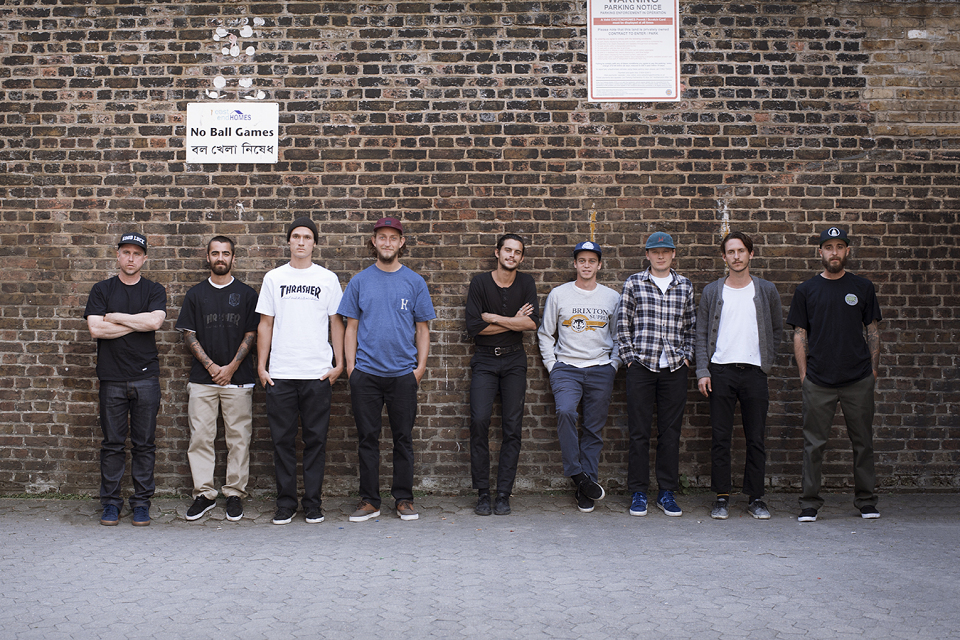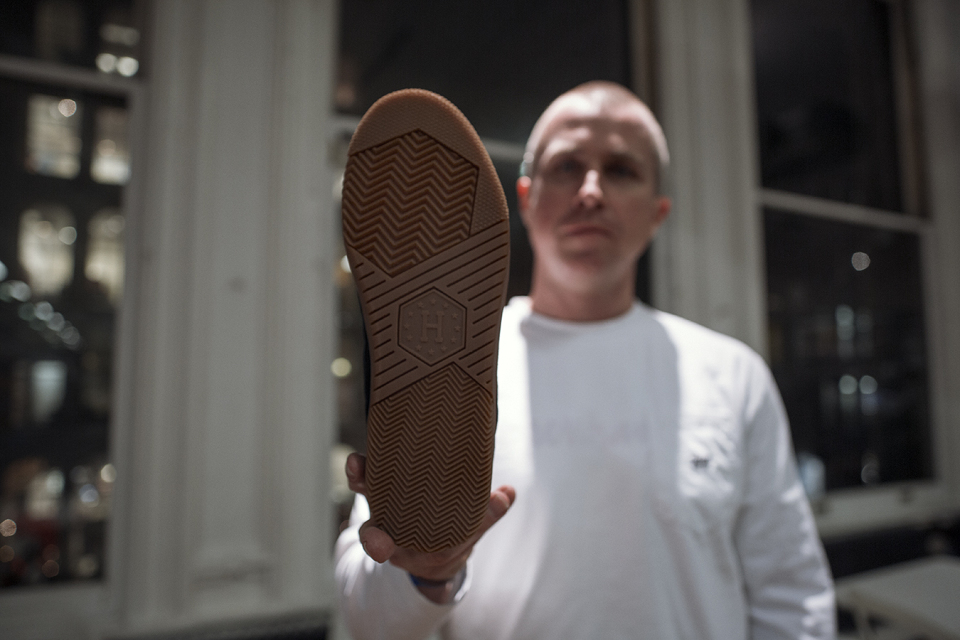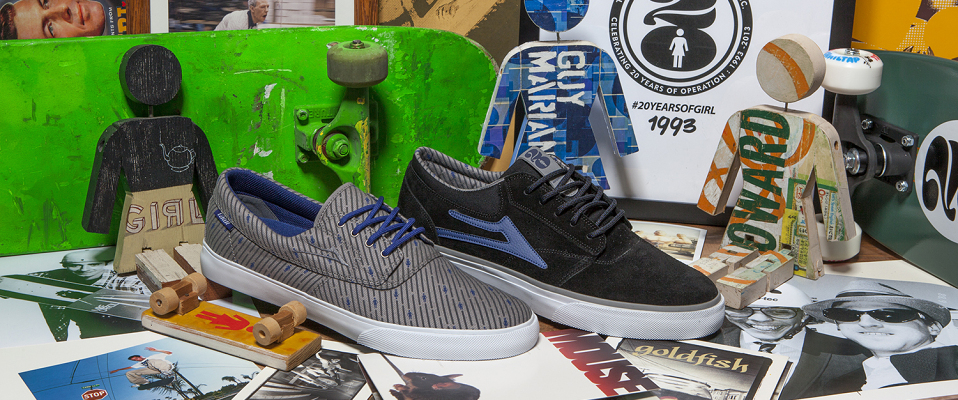The debate surrounding mainstream footwear’s impact on skateboarding has been the focus of heated political dispute and industry navel gazing since Nike successfully bellied up to skateboarding’s table in 2002. Today though the speculative years are largely over with non-endemic brands standing as top sellers globally – leaving many of the skate industry’s independent footwear manufacturers faced with new challenges for the future.
Highsnobiety contacted some of these industry decision makers to weigh in their perspectives on the skate shoe business, product innovation, and mainstream athletics’ impact on the market and culture overall. Among them is etnies owner and founder Pierre Andre Senizergues, HUF founder Keith Hufnagel and Lakai Brand Manager Kelly Bird.
For a group who’s witnessed more than 20 years of skateboard industry evolution both as pros and executives, how would you describe what’s going on in skateboarding today from a footwear manufacturer’s point of view?
Hufnagel: It’s a complicated situation we’re in right now. In recent years we’ve seen major corporations make their way into skateboarding, which has really changed a lot of the structure of our culture and industry. On one hand a lot of money has been invested into skateboarding, but oftentimes it’s not quite clear if those resources are being distributed to the right people. Yes, there are some pros these days that are able to make a great living off skateboarding, which is amazing, but it’s a sad day for skateboarding when skateboard footwear and the industry in general is becoming more and more controlled by these big corporate companies. The more accepted these big corporations become in skateboarding, the harder it is for the smaller, independent brands to compete and maintain a voice, which unfortunately results in the corporations having a large influence on the direction and shape of skateboarding.
Senizergues: It seems that a lot of skateboard shoes have lost their reason to be a skateboard shoe by following commodity trends or by simply not being manufactured by skateboarders.
Bird: Let’s just say that the “independent” cheerleading happening at today’s board wall is noticeably lacking by the time you arrive at the shoe wall. I can’t imagine that irony is lost on everyone. You can’t check a kid’s gear and automatically draw the conclusion that you’re the only two kids in school that know what Thrasher is anymore. You and the quarterback show up to school in the same outfit and neither one of you think it’s weird. He actually invites you to his party now instead of trying to flush your head down the toilet. You go to his party and have an awesome time. He lets you borrow his copy of Thrasher the next day, then Lil Wayne calls you to go skate.
Major athletic footwear companies have pretty well assimilated themselves into the skateboard industry – sponsoring top pros, creating new products, and promoting and building global events and contests. Do you all agree? Is there still some wariness about their presence and motives in the industry? Is the fact that they’re from “outside” skateboarding still a relevant issue to end consumers?
Bird: It’s obvious they’ve done pretty well at achieving their motives, so if people are still weary at this point, they’re a little late to the party. If the ultimate goal is to make skateboarding a wholly owned subsidiary of a global brand, then yeah, that’s not that rad. Who knows if that’s really the plan, but when the need to constantly show growth is an undeniable sequence in your DNA, it fuels the weariness.
Hufnagel: When you’re a skateboarder, whether you’ve started your own brand or depend on your sponsors for your next check, you are investing your time and hard work for the love of it – you wake up to go skateboard or work because you are psyched on skateboarding and want to involve yourself in it as much as you can. So when it comes to decisions being made about skateboarding by people that are not personally invested out of a passion for skateboarding, then it becomes a concern as to their motivation.
We’ve seen skateboarding rise in and out of popularity, and when it has fallen out of fashion, when there is no money to be made, we have seen those “outsiders” just move onto the next big thing. Skateboarding, at this point, is a billion-dollar industry, and these are companies interested in expanding their footwear categories – skateboarding is a perfect industry to do it in. For the majority and younger generation though, there seems to be very little wariness about the big boys coming in. It used to be looked down upon, but these days no one talks about it anymore. In this sense, being from the outside no longer matters. These big companies have put in a lot of money and effort; have brought in enough people to the point that no one sees them as outsiders, especially the youth that have essentially grown up with these brands available to them.
The industry is now seeing the first generation of skaters who’ve never known a skate shop wall without Nike, adidas or Converse on it. What about this new generation of skaters themselves? Are they somehow different from skaters from previous generations?
Senizergues: The ’70s generation has grown up with skate shops that most likely had no shoes in store. The ’80s ushered in the introduction of skate shoes in skate shops. The ’90s skate shop became footwear stores as well as skate shops. In the millennium we saw giant sports brands show up and now their skate shoes can be found everywhere in heavy mass distribution. The challenge is that with the presence of this, skaters have a lot of options to shop elsewhere than skate shops. Perhaps this new generation of skaters will find that skate shops are the place to find unique product and brands.
Bird: I’m guessing the reasons kids start skating today aren’t entirely the same as they were in the past. But regardless of what draws you in now, I’m also guessing what keeps you hooked hasn’t changed. There’s no feeling like it and there never will be no matter what decade you were born. We’re just not outcasts anymore. Some people like that, some are still nostalgic for the days when we were. An ollie today still feels the same way it did in ’84 though.
Hufnagel: The next generation will not be any different – if you love skateboarding, you love skateboarding. Times change, companies go in and out of favor, one kid starts skateboarding one day and another person stops the next – it’s all relative. This is just a new generation and we all have to deal with it.
Do you believe the values of the big footwear companies’ business are in cultural conflict with the values of skateboarding? Have in some way those values permeated or changed the cultural fabric of skateboarding?
Senizergues: Yes, the values of mega corporations definitely interfere with skateboarding values and our culture. Their interest is a focus on money, not on preserving or progressing skateboarding culture. They try to control and change us within their own competencies. The best example of this is by trying to make skateboarding a sport. For those of us who grew up skateboarding, we know that skateboarding is an art, not a sport. It’s natural for brands outside of our industry to want to capitalize on what we have created and try build in our skate community – these companies are driven by their bottom line and so they see opportunities to generate significant revenue. They came in with their giant structure and resources. No one is surprised that they have been able to do this. Competition always pushes us to be better, that is the normal course. But what bothers me is that they lure our industry by investing in market share with no guarantee that they will stay.
Hufnagel: Yes, I think the values have changed. When skateboarders get kicked off teams for smoking weed, getting too drunk or just doing one stupid thing, then things have changed. With skateboarding becoming so commercialized, there are sacrifices to be made on both ends. The big companies have to realize what subculture they have gotten involved with and deal with everything that comes along with it. But skateboarding has also changed as it has become more mainstream. For better or for worse it’s just not what it was before. This discussion is for the older crew and maybe some of the young guys, but I don’t think most people care anymore or even understand.
Some argue independent brands should use the competition from the majors as an opportunity to become more inspired with their own businesses – to become tougher and more innovative. Do you agree? Are there limits to that position? Is there a point where you simply can’t compete?
Senizergues: You can always innovate, even being small. Innovation is what drives entrepreneurship, which is how people can change the game. It’s important to remember that all brands before becoming sizable started small. There are always ways to compete. I also think everybody needs to evolve to make skateboarding happen by innovating – whether that’s through their brand, at the retail level, and at the rider level – it’s what keeps our culture going. The culture is at a core level but it comes to life in an impactful way when you get skateboarding involvement out in the larger community. It does something to spark movement.
Bird: Of course, but it’s not like the brands that were once prevalent on the walls at skate retail didn’t have what it took to compete from an infrastructure standpoint. What most of them lacked was good foresight and a check on their hubris. They thought the party would never end and then got caught out there fully exposed in nothing but some bro boots when it did. That’s the real lesson. You can always compete if you’re paying attention and thinking further ahead than the next trade show party.
Hufnagel: Using the competition as a driving force is important. Skateboard brands need to get more creative and take their business to the next level. There’s some point where it’s either you sit there and complain or you do something about the situation. Yeah, the competition can be difficult, but you have to get up and fight for your piece of the pie. There are always limits, but there are also a million ways to be creative and innovative in order to work around those limits. You can always compete – you just have to find the way that works best for you or your brand. Rather than talk about the situation, you have to make an effort to create the situation. And I feel the underground will always have the advantage. Maybe not in money, but in design and culture and having its ear to the ground.
Skateboard brands have traditionally relied heavily on assembling the best team of pro riders possible. Does marketing in this sense ultimately prevail over product?
Senizergues: Footwear product is always king to me – we have to deliver the best product in order to be true to who we are. We definitely believe that team marketing plays a crucial role as it is the megaphone about the product that we deliver. I believe skaters still think for themselves and are not influenced as much as people may assume by marketing. Rather they choose what they believe is good for them. Today with the digital age, marketing has become more available to everyone – in essence it has democratized demand creation and has evolved in new ways. This is a major change and allows for new beliefs to be shared that can change the market. I bet some surprises are coming along this way for us to see.
Hufnagel: No way – not these days. You need to have product that is as good as your team. If your product sucks, the team means nothing. Everyone is good at skateboarding these days, so there has to be a balance. You have to have product that your team backs and your fans back. You can’t just pay some superstar an outrageous amount of money to wear shoes that suck. People see right through that these days. Of course you want to put together the best team possible, but you also want to make shoes that they are genuinely psyched to represent.
Would you say that pros are more of a commodity now than ever? How does an independent brand compete when riders can be easily lured away by the competition to the tune of hundreds of thousands or more?
Senizergues: No matter what era in skateboarding, top riders always have been presented with better financial offers. Skate companies must compete with what they can offer and sometimes that isn’t represented in a dollar amount. Sometimes it’s simply about being committed to skateboarding.
Hufnagel: I did it. I gave my riders freedom and an opinion. The riders really just want to be creative and continue to do what they have been doing their whole lives on a skateboard. There will always be the ones that get away but they may look back and wish that they had gone with the smaller guy. I see it all the time now. I was a very small company when we first started and wanted all the rad riders, but couldn’t take them away from the money. I would tell the guys that had big offers to just go do it and not worry about it, because in the end you have to look out for your own career as well. I guess the best thing is to just work on establishing a brand that people are psyched to ride for, even if it means making less.
Bird: You stay true to who you are even when it’s not the most popular thing to do from a sales standpoint. That doesn’t appeal to everybody, but it appeals to the people we want to be associated with, and there are still enough of them out there.
Can you blame pros for chasing the biggest contracts they can get? How much responsibility do pros have in this sense with the choices they make?
Hufnagel: You can’t blame them. It’s a life choice. Skateboarding can be a very profitable career these days, but pros still have to take responsibility for the decisions they make – and that doesn’t always mean taking the higher offers. I’ve seen some people make career choices that they’ve fully regretted later down the line. It’s important to believe in the brand that you choose to ride for and understand that signing a contract with a big corporation means branding yourself with that company for the term of the contract.
Senizergues: I am not a judge of what other skaters do. I will never be able to understand their own social and economic reasons for the choices they make. I always stand for skateboarding – dedication, commitment and passion for our culture. There are still pros out there that believe the same way that I do. I am also encouraged and inspired by the amount of great skaters in our community that demonstrate great loyalty to skateboarding. I have to say that I’m not just inspired, I’m humbled by it. I am humbled and honored when someone who has the same lucrative options presented to them, yet chooses to remain on a team with people who are working hard toward the same goal of progressing skateboarding.
Bird: Skateboarding has always been an inherently shortsighted venture because there is no players union out there trying to look out for you during or after your career. Skateboarders have been taken advantage of at every turn, which unfortunately has fostered a lottery mentality in most of them. Hopefully, when they do hit it, they do things not just for themselves, but they do things that will foster opportunities for future generations to realize the same dreams they had. That’s where the responsibility lies. There are guys doing it but it would definitely be cool to see a few more HUFs out there.
Are there arrows in the quiver of independent footwear brands that the big footwear companies don’t have? What are they? How are they used? How effective are they?
Hufnagel: Being smaller can definitely have its advantages. You can act a lot faster to the trends and the youth. You have much more creative freedom. One of the major benefits of being an independent brand is that you don’t have to deal with all the bullshit and hoops to jump through that you encounter in big corporations. We don’t have to answer to anyone but ourselves.
Bird: The fact that you don’t have to go through way too many layers of management and three weeks’ worth of meetings to decide whether the toecap should be suede or nubuck is always a plus. Sure, being fat means you’re eating, but there’s also something to be said for being able to see your junk when you pee.
Senizergues: The arrows are based on being closer to the culture, by being more authentic, more passionate, more innovative and more involved. We’re not trying to be their size. We are just being who we are. They are always trying to grow as fast as possible and in the process of that drive for growth, they can easily lose direction on what is important to a culture.
What does the future of skateboard footwear landscape look like to you? In spite of heightened competition is there still opportunity for independent brands to step up?
Senizergues: I see retailers regaining their independence from the mega brands. They have been dictated to for far too long. Many are expressing how nice it is to have their freedom again, which allows them to be more creative and bring in more excitement to the store, which helps create demand. Skateboard shops cannot be a commodity or they will disappear like it has happened in many instances. It is still time to change and bring the future of skateboarding by being authentic, passionate, committed, and by bringing realness and excitement to make it happen. New brands can come but will require experience in our culture, innovation, and the passion to make it happen.
Bird: If there are good ideas, there is always opportunity. All I can hope is that the folks who have dedicated their lives to skateboarding are the ones that will birth and develop those ideas. Powell, Vision and Santa Cruz were the big tickets in the ‘90s, and we all know the next chapter of that story pretty well. It can happen, two feet at a time.
Hufnagel: The future is looking really bright. The market has expanded so much and so quickly, and it is time for some new blood to come in and make a name. There will always be opportunity for new brands. They just need solid designs, good production and funding to make it in this new corporate landscape.
Text by Cullen Poythress


